A将下列各句改为否定句一般疑问句作肯定和否定回答
- 格式:docx
- 大小:21.34 KB
- 文档页数:5
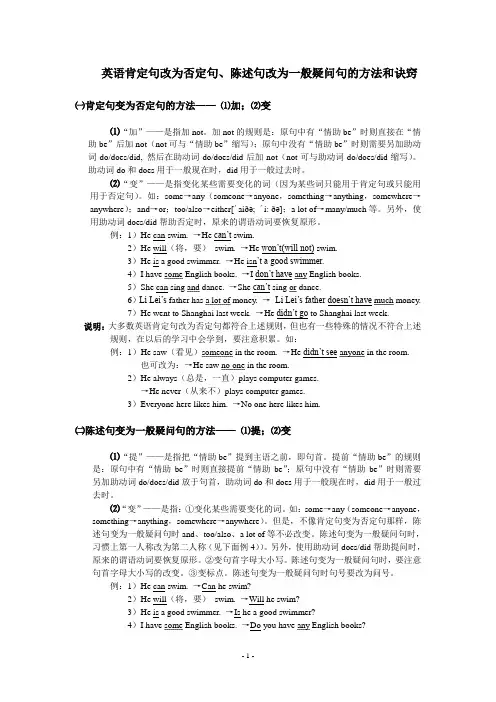
英语肯定句改为否定句、陈述句改为一般疑问句的方法和诀窍㈠肯定句变为否定句的方法——⑴加;⑵变⑴“加”——是指加not。
加not的规则是:原句中有“情助be”时则直接在“情助be”后加not(not可与“情助be”缩写);原句中没有“情助be”时则需要另加助动词do/does/did, 然后在助动词do/does/did后加not(not可与助动词do/does/did缩写)。
助动词do和does用于一般现在时,did用于一般过去时。
⑵“变”——是指变化某些需要变化的词(因为某些词只能用于肯定句或只能用用于否定句)。
如:some→any(someone→anyone,something→anything,somewhere→anywhere);and→or;too/also→either[´aiðə; ´i: ðə];a lot of→many/much等。
另外,使用助动词does/did帮助否定时,原来的谓语动词要恢复原形。
例:1)He can swim. →He can’t swim.2)He will(将,要)swim. →He won’t(will not) swim.3)He is a good swimmer. →He isn’t a good swimmer.4)I have some English books. →I don’t have any English books.5)She can sing and dance. →She can’t sing or dance.6)Li Lei’s father has a lot of money. →Li Lei’s father doesn’t have much money.7)He went to Shanghai last week. →He didn’t go to Shanghai last week.说明:大多数英语肯定句改为否定句都符合上述规则,但也有一些特殊的情况不符合上述规则,在以后的学习中会学到,要注意积累。
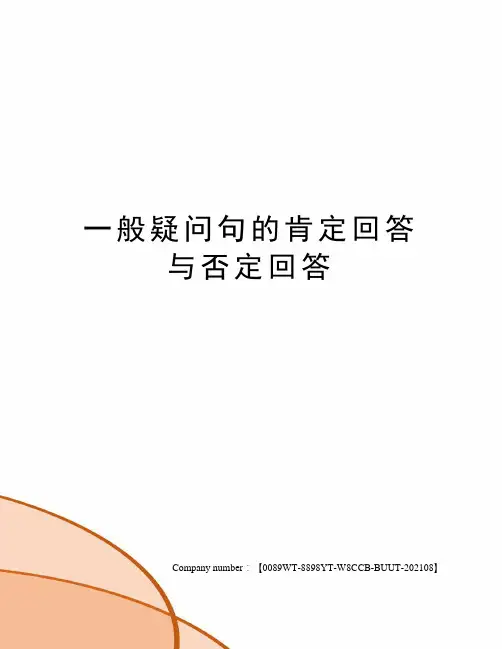
一般疑问句的肯定回答与否定回答Company number:【0089WT-8898YT-W8CCB-BUUT-202108】一般疑问句的肯定回答与否定回答1. 主语一致IsheTomYes,,heisn’t.Aretheygood friendsYes,,theyaren’t.注意①:问句用you,回答改用I或We AreyouJackYes,,I’m not. AreyouChineseYes,,wearen’t. 注意②:问句用this/that或these/those,回答改用it或theyIsthisyour bookYes,,itisn’t.Arethoseyour books Yes,,theyaren’t.练一练Are you GinaAre those his erasersAre you 12 years oldIs she a good teacherAre these his books含be动词的句子变疑问和否定句变法Be动词包含:am is are 否定句:eg:It is a goat. It is not a goat.You are a teacher. You are not a teacher.总结:含be动词的句子改否定句就是在be动词后面加not疑问句:1一般情况把be动词提前,其余成分照抄2句子中出现I am 或We are 是将它们改成Are you其余成分照抄3句子中出现My 或our时,先将句子改成一般疑问句再将my或our变成your一、将下列句子改为一般疑问句1、This is my handbag.2、That is his pencil.3、It is his house .4、This is your car.5、That is her pen.二、看下列句子做肯定回答和否定回答1、Is this his book2、Is that your watch3、Is it a skirt4、Is he a teacher5、Are you happy三、将下列句子改为否定句1、This is my shirt.2、That is your car.3、He is a doctor.4、It is her dog.5、We are Chinese.。
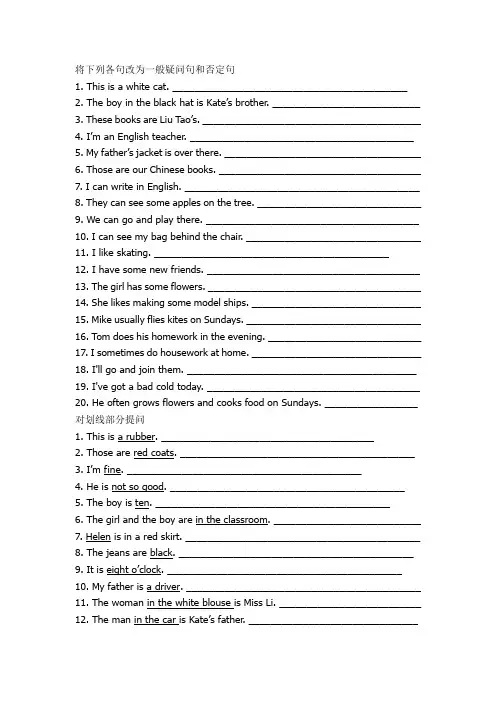
将下列各句改为一般疑问句和否定句1. This is a white cat. ___________________________________________2. The boy in the black hat is Kate’s brother. ___________________________3. These books are Liu Tao’s. ________________________________________4. I’m an English teacher. _________________________________________5. My father’s jacket is over there. ____________________________________6. Those are our Chinese books. _____________________________________7. I can write in English. ___________________________________________8. They can see some apples on the tree. ______________________________9. We can go and play there. _______________________________________10. I can see my bag behind the chair. ________________________________11. I like skating. ___________________________________________12. I have some new friends. _______________________________________13. The girl has some flowers. _______________________________________14. She likes making some model ships. _______________________________15. Mike usually flies kites on Sundays. ________________________________16. Tom does his homework in the evening. ____________________________17. I sometimes do housework at home. _______________________________18. I'll go and join them. __________________________________________19. I've got a bad cold today. _______________________________________20. He often grows flowers and cooks food on Sundays. _________________ 对划线部分提问1. This is a rubber. _______________________________________2. Those are red coats. ___________________________________________3. I’m fine. ___________________________________________4. He is not so good. ___________________________________________5. The boy is ten. ___________________________________________6. The girl and the boy are in the classroom. ___________________________7. Helen is in a red skirt. ___________________________________________8. The jeans are black. ___________________________________________9. It is eight o’clock. ___________________________________________10. My father is a driver. ___________________________________________11. The woman in the white blouse is Miss Li. __________________________12. The man in the car is Kate’s father. _______________________________13. Her sister is a student. __________________________________________14. This is my father’s car. __________________________________________15. There’s a knife in the box. _______________________________________16. There are ten books on the table. _________________________________17. The book and the pencil are ten yuan. _____________________________18. Jim and Tom are very hungry. ____________________________________19. We can make some model planes. ________________________________20. The boys and the girls like pandas. _______________________________21. I do my homework on Saturday afternoon. __________________________22. Wang Bing sometimes does housework at home. _____________________23. We like playing football very much_________________________________。
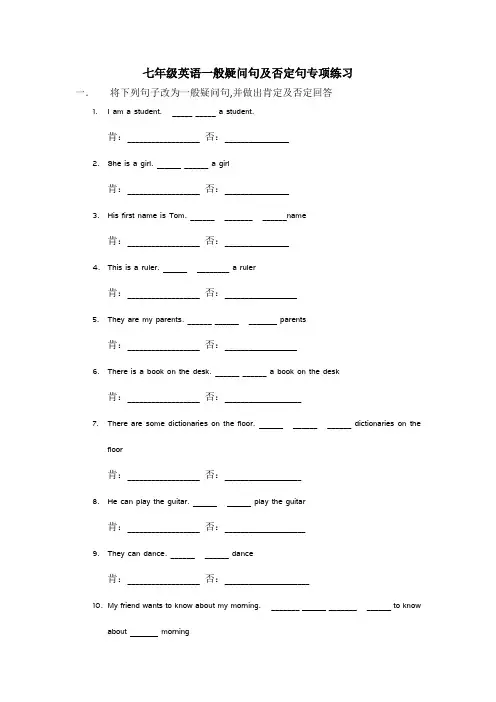
七年级英语一般疑问句及否定句专项练习一.将下列句子改为一般疑问句,并做出肯定及否定回答1.I am a student. _____ _____ a student.肯:__________________ 否:________________2.She is a girl. ______ ______ a girl肯:__________________ 否:________________3.His first name is Tom. ______ _______ ______name肯:__________________ 否:________________4.This is a ruler. ______ ________ a ruler肯:__________________ 否:__________________5.They are my parents. ______ ______ _______ parents肯:__________________ 否:__________________6.There is a book on the desk. ______ ______ a book on the desk肯:__________________ 否:___________________7.There are some dictionaries on the floor. ______ ______ ______ dictionaries on thefloor肯:__________________ 否:___________________8.He can play the guitar. ______ ______ play the guitar肯:__________________ 否:____________________9.They can dance. ______ ______ dance肯:__________________ 否:_____________________10.My friend wants to know about my morning. _______ ______ _______ ______ to knowabout _______ morning11.Tony has a computer. ______ Tony ______ a computer肯:__________________ 否:_____________________12.Mr. White is very busy. ______ Mr. White a computer肯:__________________ 否:_____________________13.He teaches us art. ______ ______ _______ us art肯:__________________ 否:_____________________14.She watches TV in the morning. ______ ______ ______ TV in the morning肯:__________________ 否:______________________15.I watch TV in the evening. _______ ______ ________ TV in the morning 肯:__________________ 否:_____________________16.He runs every day. _______ ______ ________ every day肯:__________________ 否:_____________________17.I want to know his name. ______ ______ ______ to know his name肯:__________________ 否:_____________________18.They study at home. ______ ______ _______ at home肯:__________________ 否:_____________________19.She studies English at school. ______ _______ _______ English at school 肯:__________________ 否:____________________20.I do my homework every day. _____ _____ ______ _____ homework every day肯:__________________ 否:_____________________21.He does his homework at 7:00 pm. ______ _______ ______ his homework at 7:00 pm22.They have five rooms. ______ ______ _______ five rooms肯:___________________ 否:_______________________23.She eats chicken for dinner. _______ ______ _______ chicken for dinner 肯:___________________ 否:_______________________24.My parents like eating ______ parents______ ______bananas肯:___________________ 否:_______________________25.We do eye exercises every day. _____ _____ _____ eye exercises every day肯:___________________ 否:________________________26.He has a green T-shirt. _______ ________ _______ a green T-shirt肯:___________________ 否:_________________________27.My birthday is October 10th. _______ ______ ________ October 10th肯:___________________ 否:__________________________28.Her favorite subject is science. ______ ______ _______ _______ science肯:___________________ 否:_________________________29.We can see some birds. _______ _______ see ______ birds肯:___________________ 否:_________________________二.将下列句子改为否定句1.There is a computer on the desk. There _____a computer on the desk.2.There are some pictures on the wall. There ______ _______ pictures on the wall.3.She is seven years old. She ______ _______ seven years old.4.I like pears. I ______ _______ pears.5.She has a soccer ball. She ________ _________ a soccer ball.6.My mother wants to go to a movie. My mother ______ ________ to go to a movie.7.Tom can play the drums. Tom ________ play the drums.8.I can sing and dance. I _______ sing ________ dance.9.She has some erasers. She _______ ________ ________ erasers.10.I think it is interesting. I _______ ________ it is interesting.11.Mary often plays sports after dinner. Mary ________ ________ ________ sports afterdinner.12.There are some tomatoes in the box. There are _______ _________ tomatoes in thebox.13.Tell him the news. _______ _______ him the news.14.She has brothers and sisters. She ________ _______brothers _______ sisters.15.I think she is right. I _______ ________ she _______ right.16.She gets up at 6:00 in the morning. She _______ ________ up at 6:00 in themorning.三.将下列句子改成复数形式1.That is a ruler. _______ ________ ________.2.This is an orange. _________ _________ oranges.3.She is my friend. _________ _________ my __________.4.Is that a pen _________ _________ ________5.I like tomato. I like ________.6.It’s a dictionary. _________ _________ _________.7.He has an English dictionary. ________ ________ English _________.8.She has a watch. ________ _________ _________.9.This is a comedy and that is a documentary. _______ _______ ________ _______________ _________ _________.10.There is a knife in the box. There ________ _________ in the box.11.She is a girl student. _______ are ________ ________.12.She’s a woman doctor. _______ _______ __________ _________.13.Who is your art teacher Who ________ your art _________14.It’s a bus. They _________ _________.15.He usually goes to bed at 10:00. They usually _______ to bed at 10:0016.Gina doesn’t play golf every day. 改为肯定句Gina _______ golf every day.17.Do you have tennis rackets 改为肯定句_______ ________ tennis rackets18.Jim doesn’t have a bag. 改为肯定句Jim _________ a bag.19.Can you sing 作否定回答________, I _________.20.Does he like speaking English 作肯定回答_________, he __________.21.Can Jane speak Chinese 作否定回答_________, ___________ __________.22.Is this boy your brother 作肯定回答__________, ___________ __________.23.Are those her books 作否定回答________, __________ ___________.24.Do they like oranges 单数形式_______ she ________ oranges25.That is an English book. 变复数句________ _________ English __________.26.These are buses. 单数形式_________ ________ _________ _________.答案:一:1. Are you Yes, I am. No, I’m not. 2. Is she Yes, she is. No, she isn’t. 3. Is his first name Yes, it is. No, it isn’t. 4. Is this Yes,it is. No, it isn’t. they your Yes, they are. No, they aren’t. 6. Is thereYes, there is. No, there isn’t. 7. Are there any Yes, there are. No, there aren’t. 8. Can he Yes,he can. No, he can’t. 9. Can they Yes, they can. No, they can’t. 10. Does your friend want your Yes, she/he does. No, she/he doesn’t. 11. Does have Yes, he does. No, he doesn’t. 12. Is Yes, he is. No, he isn’t.13. Does he teach Yes, he does. No, he doesn’t. 14. Does he watch Yes, he does. No, he doesn’t. 15. Do you watch Yes, I do. No, I don’t. 16. Does he run Yes, he does. No, he doesn’t. 17. Do you want Yes, I do. No, I don’t. 18. Do they study Yes, they do. No, they don’t. 19. Does she study Yes, she does. No, she doesn’t. 20. Do you do your Yes, I do. No, I don’t. 21. Does he do Yes, he does. No, he doesn’t. 22. Do they have Yes, they do. No, they don’t. 23. Does she eat Yes, she does. No, she doesn’t. 24. Do your like eating Yes, they do. No, they don’t. 25. Do you do Yes, we do. No, we don’t. 26. Does he have Yes, he does. No, he doesn’t. 27. Is your birthday Yes, it is. No, it isn’t. 28. Is her favorite subject Yes, it is. No, it isn’t. 29. Can you any Yes, I can, No, I can’t.二.’t 2. aren’t any 3. Is not 4. Don’t like 5. Doesn’t have 6. Doesn’t want 7. Can’t 8. Can’t or 9. Doesn’t have any 10. don’t have 11. doesn’t often play 12. not any 13. don’t tell 14. doesn’t have or 15. don’t think 16. doesn’t get三.1. Those are rulers 2. These are 3. They are friends 4. Are those pens 5. Tomatoes are dictionaries 7. They have dictionaries 8. They have watches 9. These are comedies and those are documentaries 10. are knives 11. They are girl students 12. They are women teachers 13. are teachers 14. are buses 15. go 16. plays 17. I have 18. has 19. Yes can 20. Yes does she can’t 22. Yes he is 23. No they aren’t 24. Does like 25. Those are books 26. This is a bus。
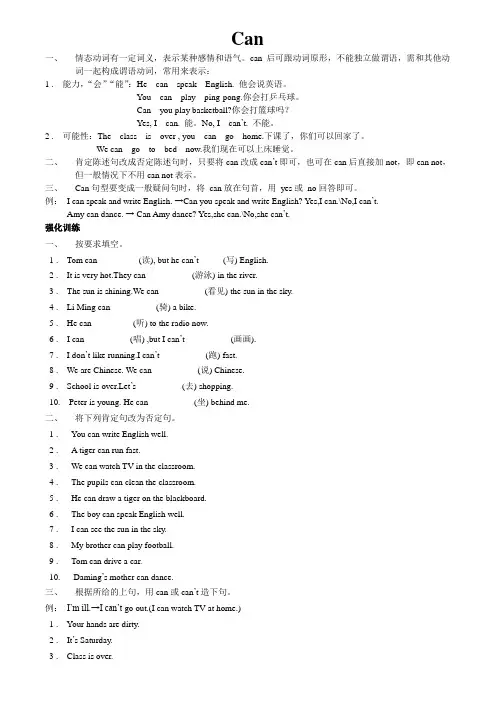
Can一、情态动词有一定词义,表示某种感情和语气。
can后可跟动词原形,不能独立做谓语,需和其他动词一起构成谓语动词,常用来表示:1 . 能力,“会”“能”:He can speak English. 他会说英语。
You can play ping-pong.你会打乒乓球。
Can you play basketball?你会打篮球吗?Yes, I can. 能。
No, I can’t. 不能。
2 . 可能性:The class is over , you can go home.下课了,你们可以回家了。
We can go to bed now.我们现在可以上床睡觉。
二、肯定陈述句改成否定陈述句时,只要将can改成can’t即可,也可在can后直接加not,即can not,但一般情况下不用can not表示。
三、Can句型要变成一般疑问句时,将can放在句首,用yes或no回答即可。
例:I can speak and write English. →Can you speak and write English? Yes,I can.\No,I can’t.Amy can dance. → Can Amy dance? Yes,she can.\No,she can’t.强化训练一、按要求填空。
1 . Tom can _________(读), but he can’t _____(写) English.2 . It is very hot.They can __________(游泳) in the river.3 . The sun is shining.We can __________(看见) the sun in the sky.4 . Li Ming can __________(骑) a bike.5 . He can _________(听) to the radio now.6 . I can __________(唱) ,but I can’t __________(画画).7 . I don’t like running.I can’t __________(跑) fast.8 . We are Chinese. We can __________(说) Chinese.9 . School is over.Let’s __________(去) shopping.10. Peter is young. He can __________(坐) behind me.二、将下列肯定句改为否定句。
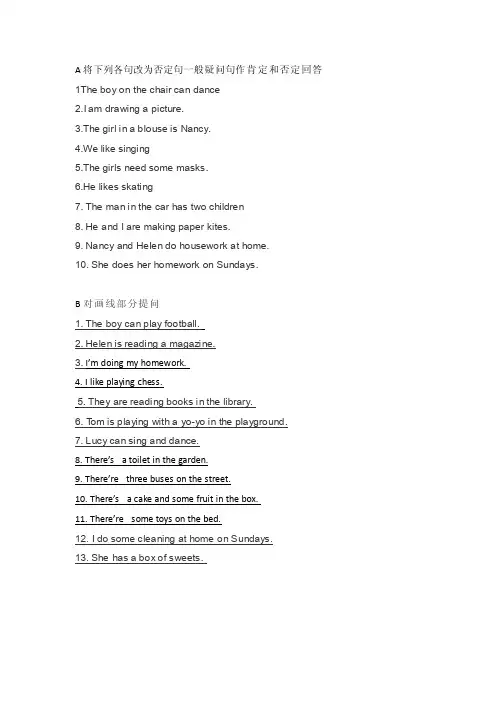
A将下列各句改为否定句一般疑问句作肯定和否定回答1The boy on the chair can dance2.I am drawing a picture.3.The girl in a blouse is Nancy.4.We like singing5.The girls need some masks.6.He likes skating7. The man in the car has two children8. He and I are making paper kites.9. Nancy and Helen do housework at home.10. She does her homework on Sundays.B对画线部分提问1. The boy can play football.2. Helen is reading a magazine.3. I’m doing my homework.4. I like playing chess.5. They are reading books in the library.6. T om is playing with a yo-yo in the playground.7. Lucy can sing and dance.8. There’s a toilet in the garden.9. There’re three buses on the street.10. There’s a cake and some fruit in the box.11. There’r e some toys on the bed.12. I do some cleaning at home on Sundays.13. She has a box of sweets.I.陈述句(肯定句,否定句)1.肯定句:1) 主语+be动词+….*I am a teacher.He is a doctor.They are students.2) 主语+do动词的不同形式+….I play computer games everyday.He plays computer games everyday.We played computer games yesterday.2.否定句:1) 主语+be动词+not+….I am not a teacher.He is not a doctor.They’re not students.2) 主语+助动词+not+do动词原形+….*I don’t play computer games everyday.He doesn’t play computer games everydayWe didn’t play computer games everyday3.Exercises:肯定句变否定句:1)I am in Class Four, Grade Five. _______________________________2) He is funny. _______________________________3) They are friends. _____________________________________4) I have a pen. _________________________5) He has a pencil. ________________________________6) They ate breakfast yesterday. _________________________________ II.疑问句(一般疑问句,特殊疑问句)1.一般疑问句:1)问:be动词+主语+…? (与前面讲过的肯定句句式比较一下) 答:Yes, 主语+be动词。
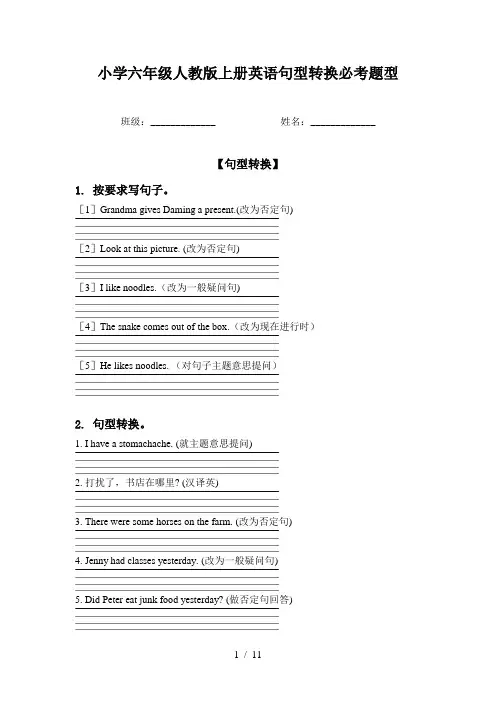
小学六年级人教版上册英语句型转换必考题型班级:_____________ 姓名:_____________【句型转换】1. 按要求写句子。
[1]Grandma gives Daming a present.(改为否定句)[2]Look at this picture. (改为否定句)[3]I like noodles.(改为一般疑问句)[4]The snake comes out of the box.(改为现在进行时)[5]He likes noodles. (对句子主题意思提问)2. 句型转换。
1. I have a stomachache. (就主题意思提问)2. 打扰了,书店在哪里? (汉译英)3. There were some horses on the farm. (改为否定句)4. Jenny had classes yesterday. (改为一般疑问句)5. Did Peter eat junk food yesterday? (做否定句回答)3. 用要求完成下列各题。
1. The bank is next to the hospital. (对句子主题意思提问)2. What’s the matter with Tom? ( have a bad headache)3. Let gym us the a match in football have(连词成句)4. There are some bananas on the table. (变否定句)5. Excuse me, where is the bus station? (按实际情况回答)4. 按要求句子。
[1]hotel, our, at, was, the, bad, weekend, (. )连词成句[2]fixed, dad, a, chair, yesterday, broken, (. )连词成句[3]I enjoyed our stay in the hotel. (改为否定句)[4]Amy 上周末想去踢足球。
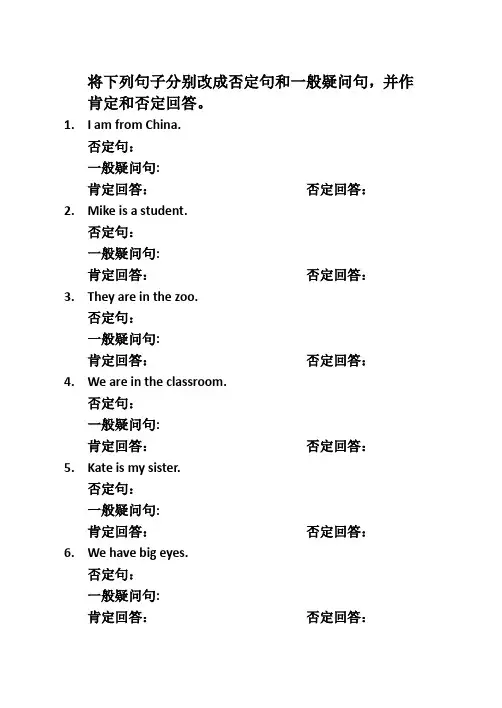
将下列句子分别改成否定句和一般疑问句,并作肯定和否定回答。
1.I am from China.
否定句:
一般疑问句:
肯定回答:否定回答:
2.Mike is a student.
否定句:
一般疑问句:
肯定回答:否定回答:
3.They are in the zoo.
否定句:
一般疑问句:
肯定回答:否定回答:
4.We are in the classroom.
否定句:
一般疑问句:
肯定回答:否定回答:
5.Kate is my sister.
否定句:
一般疑问句:
肯定回答:否定回答:
6.We have big eyes.
否定句:
一般疑问句:
肯定回答:否定回答:
7.She has a brother and a sister.
否定句:
一般疑问句:
肯定回答:否定回答:8.They like reading books.
否定句:
一般疑问句:
肯定回答:否定回答:9.Su Hai and Su Yang live in a new house.
否定句:
一般疑问句:
肯定回答:否定回答:10.We play basketball on Sundays.
否定句:
一般疑问句:
肯定回答:否定回答:11.Tom goes to school by bike everyday .
否定句:
一般疑问句:
肯定回答:否定回答:12.She does her homework at home at 8 o’clock everyday.
否定句:
一般疑问句:
肯定回答:否定回答:。
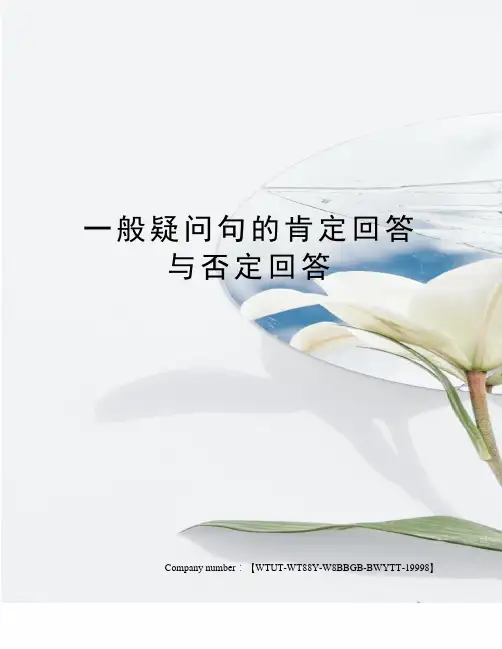
一般疑问句的肯定回答与否定回答Company number:【WTUT-WT88Y-W8BBGB-BWYTT-19998】一般疑问句的肯定回答与否定回答1. 主语一致IsheTomYes,heis.No,heisn’t.Aretheygood friendsYes,theyare.No,theyaren’t.注意①:问句用you,回答改用I或We AreyouJackYes,I am.No,I’m not. AreyouChineseYes,weare.No,wearen’t.注意②:问句用this/that或these/those,回答改用it或theyIsthisyour bookYes,itis.No,itisn’t.Arethoseyour books Yes,theyare.No,theyaren’t.练一练Are you GinaAre those his erasersAre you 12 years oldIs she a good teacherAre these his books含be动词的句子变疑问和否定句变法Be动词包含:am is are 否定句:eg:It is a goat. It is not a goat.You are a teacher. You are not a teacher.总结:含be动词的句子改否定句就是在be动词后面加not疑问句:1一般情况把be动词提前,其余成分照抄2句子中出现I am 或We are 是将它们改成Are you其余成分照抄3句子中出现My 或our时,先将句子改成一般疑问句再将my或our变成your一、将下列句子改为一般疑问句1、This is my handbag.2、That is his pencil.3、It is his house .4、This is your car.5、That is her pen.二、看下列句子做肯定回答和否定回答1、Is this his book2、Is that your watch3、Is it a skirt4、Is he a teacher5、Are you happy三、将下列句子改为否定句1、This is my shirt.2、That is your car.3、He is a doctor.4、It is her dog.5、We are Chinese.。
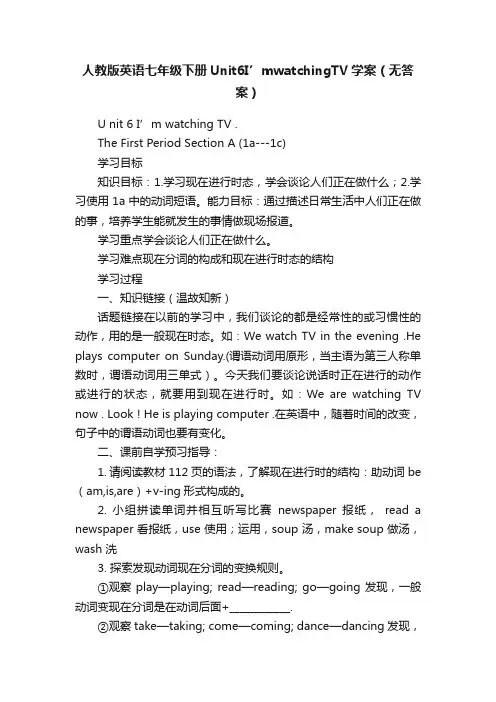
人教版英语七年级下册Unit6I’mwatchingTV学案(无答案)U nit 6 I’m watching TV .The First Period Section A (1a---1c)学习目标知识目标:1.学习现在进行时态,学会谈论人们正在做什么;2.学习使用1a中的动词短语。
能力目标:通过描述日常生活中人们正在做的事,培养学生能就发生的事情做现场报道。
学习重点学会谈论人们正在做什么。
学习难点现在分词的构成和现在进行时态的结构学习过程一、知识链接(温故知新)话题链接在以前的学习中,我们谈论的都是经常性的或习惯性的动作,用的是一般现在时态。
如:We watch TV in the evening .He plays computer on Sunday.(谓语动词用原形,当主语为第三人称单数时,谓语动词用三单式)。
今天我们要谈论说话时正在进行的动作或进行的状态,就要用到现在进行时。
如:We are watching TV now . Look ! He is playing computer .在英语中,随着时间的改变,句子中的谓语动词也要有变化。
二、课前自学预习指导:1. 请阅读教材112页的语法,了解现在进行时的结构:助动词be (am,is,are)+v-ing形式构成的。
2. 小组拼读单词并相互听写比赛newspaper 报纸,read a newspaper 看报纸,use 使用;运用,soup 汤,make soup 做汤,wash 洗3. 探索发现动词现在分词的变换规则。
①观察play—playing; read—reading; go—going发现,一般动词变现在分词是在动词后面+____________.②观察take—taking; come—coming; dance—dancing发现,以e结尾的动词变现在分词要___________________________.③观察run—running; begin—beginning; get—getting发现以重读闭音节结尾的单词,且词尾只有一个辅音字母变现在分词应_________________________________.④观察study—studying; fly—flying发现,以字母+ 结尾的动词变现在分词是_____________________________________.尝试练习:读下列动词,翻译并试着写出动词的-ing形式do()_________read()_________watch()_________ talk()_________ clean()_________wash()________listen()________use ()_________ make()_________ run()_________exercise()_________go()_________ 2. 预习1a并翻译其中短语看电视______ ___在电话中交谈____ _____ 看报____ _____ 听CD___ ______使用电脑做汤洗餐具温馨提示:英语中“看”法各异。
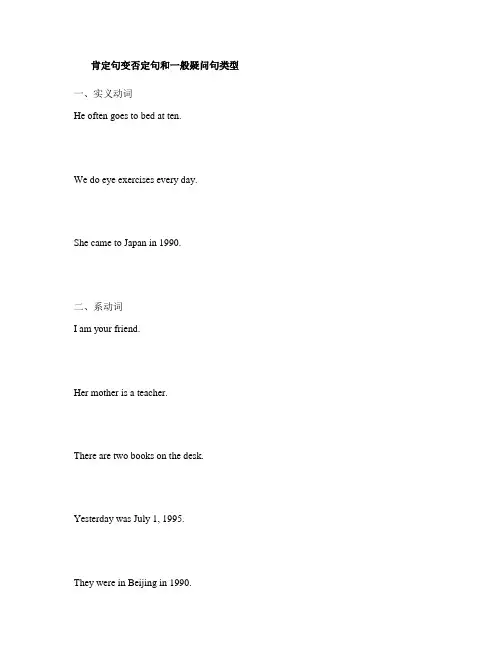
肯定句变否定句和一般疑问句类型一、实义动词He often goes to bed at ten._________________________________________ _________________________________________ We do eye exercises every day._________________________________________ _________________________________________ She came to Japan in 1990._________________________________________ _________________________________________二、系动词I am your friend._________________________________________ _________________________________________ Her mother is a teacher._________________________________________ _________________________________________ There are two books on the desk._________________________________________ _________________________________________ Yesterday was July 1, 1995._________________________________________ _________________________________________ They were in Beijing in 1990.__________________________________________________________________________________三、进行时The girl is standing at the station.__________________________________________________________________________________The students are playing basketball on the playground. __________________________________________________________________________________I am looking for a job recently.__________________________________________________________________________________He was writing letters at this time last night.__________________________________________________________________________________We were having a meeting this time yesterday.__________________________________________________________________________________四、被动语态The man was run over by a car.__________________________________________________________________________________The plan has been made.__________________________________________________________________________________Kate may be elected our monitor._________________________________________ _________________________________________ 五、助动词He has been to England twice._________________________________________ _________________________________________ We have stayed here for six years._________________________________________ _________________________________________ Tom had finished the task before nine o’clock._________________________________________ _________________________________________ 六、情态动词Lucy will be back in four days._________________________________________ _________________________________________ You can use this dictionary._________________________________________ _________________________________________ You need go tomorrow._________________________________________ _________________________________________ We ought to answer this question now?_________________________________________Little Jane dared go alone._________________________________________ _________________________________________ 将下列陈述句变为否定句和一般疑问句。
肯定句变为否定句的方法;一般疑问句的回答1)肯定句变为否定句的方法把肯定句改成否定句分以下情况:1、句中有be动词的,在be动词后加not;2、句中有情态动词的(can ,should,must ,would),在情态动词后面加not;3、句中没有be动词和情态动词的,在动词前加d on’t或doesn’t;①句中动词为原形的,加d on’t.如: I like apples. →Ido n’t like apples.②句中动词为三单形式的,加does n’t,并将三单式的动词还原成原形。
如:He likes apples.→ He does n’t like apples.4.肯定句中的some在否定句中应改为any如:There are some students in the classroom.→ There are not any students in the classroom.2) 一般疑问句的回答a) Is Jim a student? b) Can I help you?c) Does she like salad? d) Do they watch TV?e) Is she reading?肯定回答: a) Yes, he is. b) Yes, you can.c) Yes, she does. d) Yes, they do. e) Yes, she is.否定回答: a) No, he isn’t. b) No, you can’t.c) No, she does’t. d) No, they don’t.e) No, she isn’t.由Be动词来问,也由Be 动词来回答be : am is areAm I a teacher? Yes, you are . No, you aren't.Is he Tom? Yes, he is. No, he isn't.Is she your friend? Yes, she is . No, she isn't.Is Lucy 8 years old? Yes, she is. No, she isn't.由助动词do, does提问,也用它们来回答Do you have a book? Yes, I have. No, I haven't. Does he have a pen? Yes, he does. No, he doesn't. Does it like to sleep? Yes, it does. No, it doesn't.情态动词,用can 问,也用它来答Can he swim? Yes, he can. No, he can't. 把下列句子改写为否定句、一般疑问句并做肯定、否定回答1. His father is an English teacher.(否定句)His father is not an English teacher.(一般疑问句)Is his father an English teacher?Yes, he is. No, he isn’t.2. They can swim.(cannot)They cannot(can’t) swim.Can they swim? Yes, they can. No, they can’t.3. I like reading English.I don’t like reading English.Do you like reading English? Yes, I do. No, I don’t.4. His sister goes to school on foot.(否定句)His sister doesn’t go to school on foot.(一般疑问句)Does his sister go to school on foot? Yes, she does. No, she doesn’t.5. Mrs Li and Kitty watch TV at night.Mrs Li and Kitty don’t watch TV at night.Do Mrs Li and Kitty watch TV at night?Yes, they do. No, they don’t.6. I do my homework after school.I don’t do my homework after school.Do you do your homework after school?Yes, I do. No, I don’t.课后练习把下列句子改写为否定句、一般疑问句及肯定、否定回答1. The boy does some housework at home.2. We are from China.3. Jim has some books.4. I have a football book.5. My aunt often watches TV.6. My parents can play ping-pong.7. They are my grandparents.8. Gina wants a cup of coffeeAre you a student? Are you students? Does he look cool?Can she draw? Can they dance?。
.将下列各句变成否定句和一般疑问句并作肯定、否定的简短回答。
1. His birthday is April 4th.2. We have an Art Festival every year.______________________________ ______________________________ ______________________________ ______________________________ 3. There are many children in the park. 4. Tom wants a big birthday cake.______________________________ ______________________________ ______________________________ ______________________________ 5. Tim's uncle works in a bookshop. 6. The keys are under the sofa.______________________________ ______________________________ ______________________________ _______莲山课件原文地址:/shti/cuyi/73006.htmI.用给单词的适当形式填空1. How much _____ ( be ) these things?2. He can ____ ( do ) Chinese Kung Fu.3. I like this movie. The movie is very _____ ( interest).4. My sister _____ ( not like ) tennis.5. Can you help kids with ____ ( swim)?II.选择题1. _____there any pencils in the table ? A. Is B. Are C. Do D. Does2. My uncle comes home very late in the evening. He is very____ .A. smallB. busyC. hotD. nile3. Mr brown likes football very much, _____he doesn’t play it. He often watches football games on TV. A. and B. but C. so D. or4. When is your birthday? ------ My birthday is _____.A. in 1991B. on MondayC. March 6 thD. twelve5. ____do you get up ? A. What B. How C. How much D. What time6. Where _____ you ______ from?A. are, comeB. are, comingC. do ,comeD. do , coming7. “_____ do you like science?” “ _____ it’s interesting.”A. Why ,BecauseB. What, SoC. When, ButD. How, Because8. September is the ____of the year. A. nine B. nineth C. ninth D. nineteen9. They come from ____. They speak ______.A.Brazil ,EnglishB.Argentina, SpanishC.France, PortngueseD.Canada, Japanese10. She often goes swimming ____ Sunday morning. A. at B. in C. on D. for11. Could you help ___, please? A. he B. she C. her D. his12. John’s parents ______to work _____7:20 ____the morning.A. goes ,at ,inB. go, in, inC. go, in, atD. go, at, in13. How much ___the black pants? A. are B. is C. do D. does14. Those are my ___. They are on the dresser. A. key B. keies C. keyes D. keys15. ---Can her aunt play the guitar? ---- No, she ____.A. canB. can’tC. doesn’tD. isIII.连词组句1. sweater, not, this, my mother’s, is ___________________.2. want, she, does, dance, to ______________________________________________ ?3. a lot, Chinese history, learn, can, I , about __________________________________.4. your, subject, what, favorite, is __________________________________________?5. go to bed, usually, time, does, she, what ___________________________________?IV.改错V.补全对话A: Hi, Can I _____you? B: Yes, please. I want to _____the art club.A: Good May I _____your name? B: Jones.A: ____your first name? B: Cindy.A: How ____are you? B: Twelve.A: How can we ___you ? B: My e-mail ___is cindy jonmes@.A: Can you draw? B: Yes, a little. I want to learn _____art. A: Here ___a card. Please fill it ____. B: Thank you.VI.完形填空My ____1____is Liu Ying . I’m a school girl. I__2__in a middle school. There are lots of girls __3__my class. I go to school at seven ___4____the morning. Classes begin __5___7:30. We have four __6__in the morning and two in __7__afternoon. After school we often play games. In the evening I __8___my homework. Sometimes I __9___TV. But I _10__a lot.( )1. A. sister B. daughter C. mother D. name( )2. A. work B. study C. teach D. stay( )3. A. in B. at C. from D. of( )4. A. in B. on C. every D. all( )5. A. on B. abort C. at D. in( )6. A. class B. classes C. the class D. schools( )7. A. a B. an C. the D. /( )8. A. does B. do C. doing D. make( )9. A. look at B. see C. watch D. am watching( )10. A. love read B. likes reading C. like read D. like reading莲山课件原文地址:/shti/cuyi/72984.htm。
英语句型转换常规基本句式的转换方法、技巧点拨“句型转换”有两种形式,一是按要求转换句型(如:要求将陈述句转换为否定句或一般疑问句;改为祈使句或感叹句;对划线部分提问等);二是“同义句转换”。
本题型在中考中重要是测试我们运用英语“句型”的能力。
“四位一体”的“句型转换”专项训练,就是为了发展我们这方面的能力。
第一类题型的转换,重点是基本句型的运用,一般都有规律可循.除了熟记基本句式的结构外,还要注意some, any; already, yet 等词在转换时的变化。
第二类句型转换(同义句转换)应该作为我们复习训练的重点.用不同的句式表达相同的意思,它标志着一个人的外语能力水平。
提高此项能力的关键是熟悉句型结构,自如运用.通过“专项训练”,积累一定数量的相关句式,达到脱口而出,信手拈来,出神入化。
基本句式的转换主要是指“肯定句、否定句、一般疑问句、特殊疑问句、反意疑问句和选择疑问句、祈使句、感叹句"的相互转换。
句式的转换一般都有一定的规律可循,我们就是要掌握它们的变化规律,能够举一反三,见此知彼。
(一)肯定句、否定句、一般疑问句的相互转换这三种句型的转换有共同的规律可循,有几个要点必须牢记。
我们可以把各种句式归为两大类:1、含有的be动词、助动词和情态动词的句子;2、只有行为动词的句子。
第1类的句子,肯定句改为否定句时,一律在be动词、助动词和情态动词后加“not”,改为一般疑问句时,一律将be动词、助动词和情态动前移到句首(首字母大写)。
肯定回答用“Yes”;否定回答用“No".“Yes”或“No"后面的主语必须用代词,“No”后面必须用否定缩略式.如:将下列句子改为否定句、一般疑问句,并做肯定、否定回答:1。
There are some computers in this school。
(be动词)There aren't any computers in this school。
句型转换一、肯定句变否定句:1、在be动词后加not。
如:is not , are not , am not, was not, were not;2、在情态动词can,should, will等后加not。
如:cannot, should not, will not;3、既有be动词又有情态动词,在情态动词后加not。
如:There won’t be a meeting.4、上述都没有的,在动词前加助动词否定形式don’t/doesn’t/didn’t。
特殊情况:1. 如果肯定句中有连词 and ,变为否定句时,通常要将 and 变为 or 。
例如:The girl can sing and dance. → The girl cannot sing or dance.2. 如果肯定句中 some ,变为否定句时, some 一般要改为 any 。
例如:There are some boys in the room. → There are not any boys in the room.3. 如果肯定句中有 too (也),变为否定句时,应将 too 改为 either 。
例如:Wang Ling is a teacher, too. → Wang Ling is not a teacher, either.4. 如果肯定句中有 already ,变为否定句时,应将 already 改为 yet ,并放在句末。
例如:The worker has finished his work already. → The worker has not finished his work yet.5. 如果肯定句中有“ had better ”,变为否定句时, not 要放在“ had better ”之后。
例如:You had better write to your teacher. → You had better not write to your teacher.6. 如果肯定句中有 always ,变为否定句时,要将 always 改为 never 。
【专项练习】把肯定句变成否定句和一般疑问句【发卷日期】2013年______月_______日【学生姓名】__________________________一、把肯定句变成否定句:分类肯定句如何变否定句例句【第一种情况】●句中有be动词(am,is,are,was,were);●直接在be动词的后加not。
●am not(无缩写形式)●is not(缩写:isn’t)●are not(缩写:aren’t)【肯定句】He is a driver.【否定句】He is not a driver.【第二种情况】●句中有情态动词;●直接在情态动词后加not。
中学阶段常用的情态动词:●can【可以】→ can not或cannot(缩写:can’t)●could【可以,can的过去式】→could not(缩写:couldn’t)●shall【将要,应该】→ shall not(缩写:shan’t)●should【将要,应该】→ should not(缩写:shouldn’t)●may【也许】→ may not(缩写:mayn't)●might【也许】→ might not(缩写:mightn’t)●will【将要】→ will not(缩写:won’t)●would【将,愿意】→ would not(缩写:wouldn’t)●must【很可能,必须】→ must not(缩写:musn’t)【肯定句】She will come tomorrow.【否定句】She will not come tomorrow.【第三种情况】(1)●句中没有be动词或情态动词;●句子是一般现在时;●直接在动词前加助动词do not。
do not(缩写:don’t)+动词原形【注意】助动词是语法功能词,自身没有词义,不可单独使用,因此没有对应的中文翻译。
【肯定句】They like apples.【否定句】They don’t like apples.【第三种情况】(2)●句中没有be动词或情态动词;●句子是一般现在时;●主语是第三人称单数;●在动词前加助动词does not;●动词变回原形。
A将下列各句改为否定句一般疑问句作肯定和否定回答1The boy on the chair can dance2.I am drawing a picture.3.The girl in a blouse is Nancy.4.We like singing5.The girls need some masks.6.He likes skating7. The man in the car has two children8. He and I are making paper kites.9. Nancy and Helen do housework at home.10. She does her homework on Sundays.B对画线部分提问1. The boy can play football.2. Helen is reading a magazine.3. I’m doing my homework.4. I like playing chess.5. They are reading books in the library.6. Tom is playing with a yo-yo in the playground.7. Lucy can sing and dance.8. There’s a toilet in the garden.9. There’re three buses on the street.10. There’s a cake and some fruit in the box.11. There’r e some toys on the bed.12. I do some cleaning at home on Sundays.13. She has a box of sweets.I.陈述句(肯定句,否定句)1.肯定句:1) 主语+be动词+….*I am a teacher.He is a doctor.They are students.2) 主语+do动词的不同形式+….I play computer games everyday.He plays computer games everyday.We played computer games yesterday.2.否定句:1) 主语+be动词+not+….I am not a teacher.He is not a doctor.They’re not students.2) 主语+助动词+not+do动词原形+….*I don’t play computer games everyday.He doesn’t play computer games everydayWe didn’t play computer games everyday3.Exercises:肯定句变否定句:1)I am in Class Four, Grade Five. _______________________________2) He is funny. _______________________________3) They are friends. _____________________________________4) I have a pen. _________________________5) He has a pencil. ________________________________6) They ate breakfast yesterday. _________________________________ II.疑问句(一般疑问句,特殊疑问句)1.一般疑问句:1)问:be动词+主语+…? (与前面讲过的肯定句句式比较一下) 答:Yes, 主语+be动词。
/No, 主语+be动词+not.*Are you a teacher?Yes, I am. No, I am not.Is he a doctor?Yes, he is. No, he is not.Are they students?Yes, they are. No, they are not.2) 问:助动词+主语+do动词的原形+…?答:Yes, 主语+助动词。
/No, 主语+助动词+not.Do you play computer games everyday? Yes, I do. No, I don’t.Does he play computer games everyday? Yes, he does. No, he doesn’t. 2.Exercises:将下列肯定句变为一般疑问句:1)I am in Class Four, Grade Five. _______________________________2) He is funny. _______________________________3) They are friends. _____________________________________4) I have a pen. _________________________5) He has a pencil. ________________________________6) They ate breakfast yesterday. _________________________________3.特殊疑问句:1)疑问词+be动词+主语+….? (与第一个一般疑问句的句式比较一下)(答句的句式同肯定句句式)*What are you? (I am a teacher.)What is he? (He is a doctor.)What are they? (They’re students.)2)疑问词+助动词+主语+do动词的原形或do/be+…?(答句的句式同肯定句句式)*What do you do every day? When do you play computer games?(I play computer games everyday.)What does he do every day? When does he play computer games?(He plays computer games everyday.)What did you do every day? When did you play computer games?(We played computer games yesterday.)4.Exercise对划线部分提问:1)My shirt is green. _______________________________2) They are in the super market. _______________________________3) I get up at 6 every morning. _____________________________________4) He plays soccer once a week. _________________________5) They ate a big meal at school yesterday_____________________________小学英语人称代词和物主代词讲解和配套习题一、人称代词人称单数复数主格宾格主格宾格第一人称 I me we us第二人称 you you you you第三人称 he him they them she her it it人称代词主格:作主语,表示谁怎么样了、干什么了。
I am a teacher.You are student.He is a student, too.We/You/They are students.人称代词宾格作宾语,表示动作行为的对象。
Give it to me.Let’s go (let’s =let us)二、物主代词数人称类别单数复数第一人称第二人称第三人称形容词性物主代词 my your his her its our your their名词性物主代词 mine yours his hers its ours yours theirs汉语我的你的他的她的它的我们的你们的他(她、它)们的形容词性物主代词(my/your/his/her/its/our/their)+名词而名词性物主代词(mine/yours/his/hers/its/ours/theirs则相单于形容词性物主代词+名词,故其后不必加名词。
如:Is this your book?No,,it isn’t,it’s hers(her book)Jim’s ,Tom’s,Maria’s一、选出括号中正确的词,在正确的词上打勾。
1. This is(my / I)mother.2. Nice to meet (your / you).3. (He / His)name is Mark.4. What’s(she / her)name?5. Excuse(me / my / I).6. Are(your / you)Miss Li?7. (I/ My)am Ben.8. (She / Her)is my sister.9. Fine , thank (your / you).10. How old is (he / his)二、用所给代词的正确形式填空。
1. These are ______ ( he ) brothers.2. That is _______( she ) sister.3. Lily is _______ ( Lucy ) sister.4. Tom, this is _____ ( me ) cousin, Mary.5. Now _____________(her parent) are in America.6. Those __________ ( child ) are _____ ( I ) father’s students.7. Do you know ______ ( it ) name?8. Mike and Tom __________ ( be ) friends.9. Thanks for helping ________( I ).10. ______(Ann安)mother is ______(we) teacher.三、单项选择。